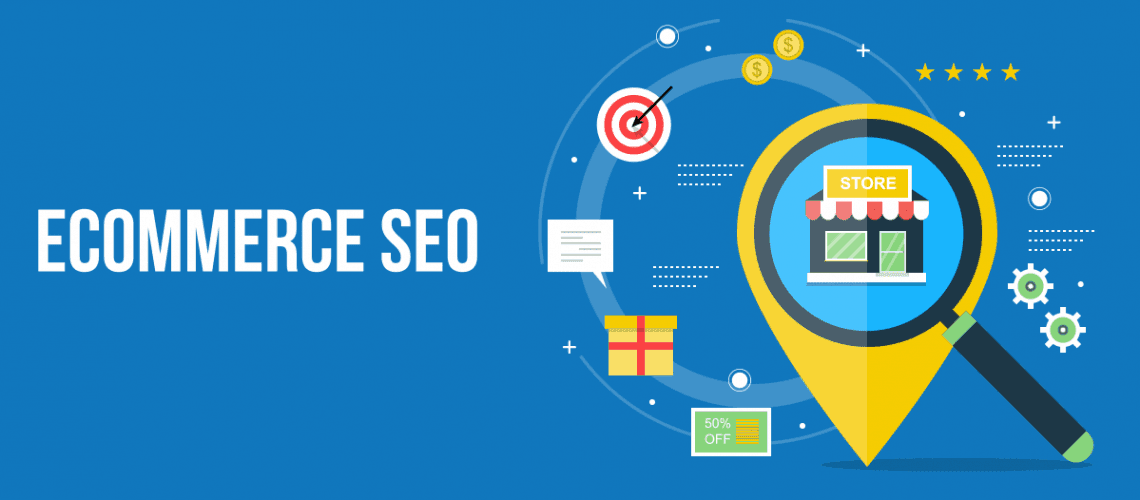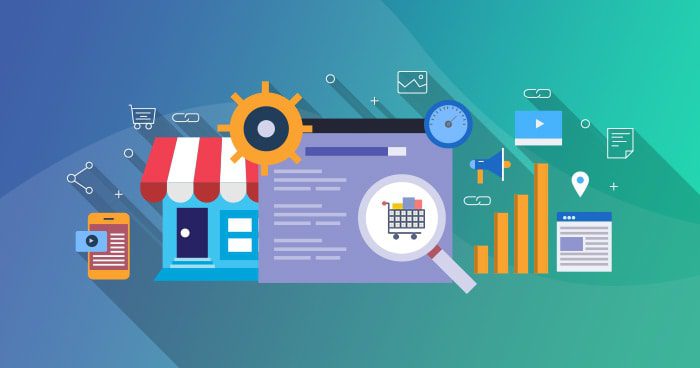What is Ecommerce SEO?
Ecommerce SEO is the process of making your online business more visible on search engine results pages (SERPs). In other words, eCommerce SEO is all about helping your online store rank higher on search engines like Google, Bing, or Yahoo! When people are searching for products that you sell, you want your business to rank as highly as possible so that you gain more traffic, which is why knowing how Ecommerce SEO works is so important for long-term business success.

Many online business owners and marketers know that a good way to get traffic is through paid search, but that a solid SEO strategy costs much less. If Internet users have ad blockers or ad blindness, it can greatly reduce the effectiveness of your paid search ad campaign. With this in mind, optimizing your content for search engines is the most logical step.
In general, eCommerce SEO will involve optimizing your product descriptions, headlines, metadata, navigational structure, internal link structure, and more for an enhanced search and user experience.
You should make it so that each product you sell has a dedicated landing page designed to draw in traffic from search engines. This extra bit of information is useful to site visitors who are researching, interested, or ready to make a purchase – all important parts of the marketing funnel.
Ecommerce SEO is also important for other web pages on your site. Specifically, the pages are not product-oriented and are considered to be more static. These include your homepage, about page, your blog articles, F.A.Q. page, contact page, and your help center answers.
Optimizing these pages is a little different, but ultimately the same. Create a list of keywords and related keywords for them (especially ones that can link a product page to a blog article, and vise versa) to sync your website so that it is easy to navigate and totally streamlined.
Why is Ecommerce SEO Important?
As the owner of an online business, one thing you have to think about how is where your customers are and what they need. Of course, these are things all business owners should think about, but for online businesses, there is a bit more depth to them. Since you are not operating from a brick and mortar store, you have to think about what your consumers are likely to do when they need a product or service that can primarily be found online.
So – what do they do? They perform a Google search. In addition to needing options, comparisons, reviews, and tips, they’re also looking for an actual solution that not only answers their problem but keeps answering it in the form of a product or service that gets what they need to be done, done.
You may have the product or service solution certain searchers are looking for, but if our website does not appear in the SERPs, you may as well not even exist. When your site does not rank, you lose invaluable access to potential Ecommerce customers who are not just interested, but qualified. Even if your products are already on the web, the main question is whether or not they can be found. And this is where eCommerce SEO comes in.
Ecommerce SEO is important because it gives your business a concrete way to reach your target audience without having to spend too much money on ads. With the help of eCommerce SEO strategies, you can begin to see people coming to your site, interacting more with your products, blogs, copy, and your calls to action.
Ecommerce SEO gives your website a tangible boost so that it reaches the people who matter, allowing you to begin building relationships with them.

How Do You Create an Ecommerce SEO Strategy?
So now that we know what eCommerce SEO is and why it matters, how do you develop a strategy of your own? With so many moving parts, engaging with SEO in this way can feel overwhelming, especially if you’re a more established store with lots of products to keep track of.
Let’s be clear: developing an eCommerce SEO strategy is going to require time, money, and resources. However, the reward of a solid strategy is so great that you won’t mind the time and energy it requires. So, where do you start when developing an eCommerce SEO strategy?
Start With A Workflow
SEO is an involved process that requires focus and intentionality. With this in mind, you have to remember that SEO requires you to meet a lot of requirements and goals. These include choosing keywords, incorporating metadata, naming images correctly, and more.
Prioritize Pages
Think about the page or pages that get the most traffic and start with them. These are the ones that must be optimized first because they’re likely where visitors will show up first.
Keep An Eye On Your Competition
A large part of your eCommerce SEO strategy should be about outshining your competition. To do this, you have to know what your top competitors are doing. Check out their sites, learn how they’re working, and build your strategy up from there.
Follow Up with CRO
Once you have a strong handle on SEO, you have to follow up with conversion rate optimization (CRO). This just ensures that you are doing what you can to optimize conversions and keep them coming.

Ecommerce SEO is all about getting your website out there, so you must ensure that your online business is ready to be found. Directive is a world-class SaaS SEO agency that understands what it takes to drive valuable traffic that converts to your website. Get a free proposal from us today to learn more.